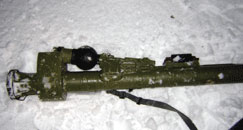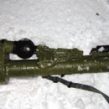
TBILISI CLAIMS TO HAVE THWARTED ATTEMPT ON SAAKASHVILI’S LIFE
Publication: Eurasia Daily Monitor Volume: 3 Issue: 28
By:

A new wave of tension is erupting between Georgia and Russia after Tbilisi announced that on February 2 it had discovered a Russian-made “Igla” portable anti-aircraft missile in Kareli — the district adjacent to the Georgian-Ossetian conflict zone. Georgian authorities suspect that the missile was deployed to down civilian aircraft or an aircraft carrying one of Georgia’s top officials, perhaps President Mikheil Saakashvili. Military experts said that Saakashvili’s French-made “Eurocopter-155,” which differs from all of Georgia’s other helicopters, would be an easy target for a self-guided Igla missile.
Tbilisi decided to publicize the discovery and perhaps gain some political leverage from the incident. Thus, it was not surprising that Georgian Interior Minister Vano Merabishvili used a February 3 news conference to allege that several paramilitary groups in the breakaway region of South Ossetia are equipped with Igla missiles. Merabishvili also recalled the car bomb attack in the Georgian town of Gori on February 1, 2005, which Georgian law-enforcement officials claim was staged by Ossetian bombers and their Russian tutors.
The Georgian air-navigation service has been instructed to suspend flights above the area where the missile was found. In an interview with TV-Rustavi-2 on February 3, Merabishvili backed away somewhat, stating that it is difficult to say exactly whose missile this was, who the alleged terrorists were targeting, and when the launcher was loaded. “Georgia has survived a terrorist act because of technical and some other reasons, including bad weather and poor visibility. The missile was not launched and was thrown away in the river,” Merabishvili said.
Defense Minister Irakli Okruashvili bluntly stated on February 3 that the Igla was installed to down Saakashvili’s helicopter and other airplanes flying on this route. He said the Georgian army does not posses any Igla-type missiles and that the Igla therefore was “brought here from Russia through the help of Ossetians.”
Givi Targamadze, chair of the Georgian parliament’s commission for defense and security, accused terrorists from the South Ossetian “criminal enclave” of using the detected missile and pointed out that the Russian services could inform them of flight plans for Saakashvili’s trips. “It is dangerous to remain in such a situation for a long time. That is why we are trying to persuade the international community to support our [South Ossetia] peace plan,” he added.
Merabishvili called on the international community to help the Georgian government to determine how the Igla turned up in the vicinity of the Georgian-Ossetian conflict zone. He announced that Tbilisi plansto ask several countries to help with the investigation, including Russia. “If Russia refuses to cooperate, it would mean that Russia either fails to control its armaments or hands them over to extremist groups,” he stated. The Russian Foreign Ministry issued a statement on February 4 that accused Georgia of being unwilling to cooperate with Russia against the “illegal proliferation” of anti-aircraft missiles because Georgian representatives refused to participate in a meeting of CIS experts last year about controls on portable anti-aircraft missiles.
On January 6, Merabishvili conducted a closed-door meeting with Vladimir Chkhikvishvili, Russian Ambassador to Georgia. They reportedly discussed the missile issue. That same day Irakli Chubinishvili, Georgian Ambassador to Russia, discussed Georgian-Russian relations at the Russian Foreign Ministry.
The South Ossetian authorities dismissed Tbilisi’s allegations that they were somehow involved in the Igla incident as a “hastily fabricated Georgian canard.” They claimed the Georgian special services had staged the missile scenario in order to discredit the South Ossetian regime and Russia and to gain more international support for plans to withdraw Russian peacekeepers from the conflict zone.
Nevertheless, some thorny questions arise with regard to the missile incident. Namely, after the dissolution of the USSR the Georgian armed forces inherited various weaponry from the Soviet Army, including the Igla. The Georgian Defense Ministry, contrary to Okruashvili’s statements, possesses seven Igla missiles, according to Kviris palitra. The Georgian Interior Ministry’s statements also contain inconsistencies. At first the ministry stated that the Igla in question was specially mounted on a tree. But local residents reported recovering the missile from the river.
Georgian authorities detonated the Igla on-site, because they said the armed missile was immovable. However, they photographed the missile first. Irakli Aladashvili, an independent military expert, claims that the missile-launcher was not armed and could have been safely transported for further examination. He argues that photos can be doctored and missile debris altered to erase the missile’s identification number. The quick destruction of physical evidence without foreign observers, which could add more credibility to the ministry’s allegations, looks strange at the least.
At the same time, it is highly likely that South Ossetian separatists, lavishly armed by Russia, posses the Igla missile and some rogue militant groups may well intend to down Saakashvili’s flight.
The investigation of the case is underway, but the buzz around the Igla incident resembles the high profile anti-Russian information campaign that Tbilisi successfully launched during the January energy crisis (EDM, January 25).
The missile incident occurred at a time of growing Georgian-Russian confrontation, and some Russian analysts even forecast local hostilities. Tbilisi, which now enjoys a stronger Western support, has become more assertive lately. But Georgian assertiveness, including externally effective but short-lived anti-Russian information campaigns have their limits. It is still unclear, at least for the Georgian public, what level of Western support Georgia can count on if the confrontation with Russia reaches a critical point.
(TV Rustavi-2, February 3; Akhali Taoba, Resonance, February 4; Kviris Palitra, February 6-17; Rosbalt, February 3-4; Regnum, Kavkas Press, February 6; Civil Georgia, February 4-6; 24 Saati, TV-RTVi, February 7)




